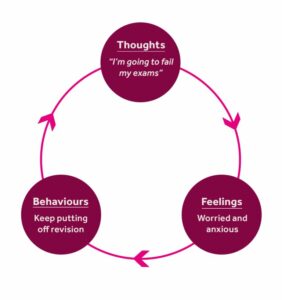Anxiety is a mental health disorder that affects millions of people in the United States. It can be incredibly debilitating and often leaves people feeling paralyzed and unable to take action. If you are one of the many people who suffer from anxiety, you know how frustrating it can be. In this blog post, we will discuss ruminating anxiety and how to stop worrying and start living!
Contents
- 1 What Is Ruminating Anxiety?
- 2 What Causes Ruminating Anxiety?
- 3 How to Stop Ruminating Anxiety?
- 3.1 Distract yourself
- 3.2 Talk to someone
- 3.3 Write things down
- 3.4 Challenge your thoughts
- 3.5 Take action
- 3.6 Practice relaxation techniques
- 3.7 Regular exercise
- 3.8 Eat healthy diet
- 3.9 Set realistic goals
- 3.10 Stop trying to control everything
- 3.11 Take therapy
- 3.12 Stay positive and stop worrying
- 3.13 Conclusion
What Is Ruminating Anxiety?
 Ruminating anxiety is described as a “vicious cycle” of intrusive, negative thoughts followed by attempts to suppress or neutralize those thoughts. This can lead to increased anxiety and distress. This condition is defined as a form of OCD or obsessive-compulsive disorder.
Ruminating anxiety is described as a “vicious cycle” of intrusive, negative thoughts followed by attempts to suppress or neutralize those thoughts. This can lead to increased anxiety and distress. This condition is defined as a form of OCD or obsessive-compulsive disorder.
Ruminating anxiety can be debilitating and make it difficult to live a normal life. It is a condition that is often misunderstood and can be hard to identify. The first step to understanding this condition is to know the symptoms. In this way, you can begin to take control of your ruminating anxiety and start living a more peaceful life.
Symptoms of Ruminating Anxiety
There are many symptoms of ruminating anxiety, but some of the most common include:
- Intrusive, negative thoughts that are hard to control or stop
- Attempts to suppress or neutralize those thoughts
- Increased anxiety and distress
- Difficulty concentrating
- Sleep problems
- Irritability
- Muscle tension
The symptoms and signs of ruminating anxiety can be different for each person. It is important to remember that not everyone will experience all of the symptoms. Some symptoms can be severe while others may be milder. If you are experiencing any of the symptoms listed above, it is important to seek help from a mental health professional.
Because ruminating anxiety is often misunderstood, it can be difficult to get the help you need. You may feel like you are the only one struggling with this condition. But know that you are not alone. There are many people who understand what you are going through and can offer support and guidance.
What Causes Ruminating Anxiety?
 Ruminating anxiety is caused by chronic worrying. Worrying is a normal part of life and everyone experiences it from time to time. However, some people worry more than others. For some, anxiety can become so severe that it interferes with daily activities.
Ruminating anxiety is caused by chronic worrying. Worrying is a normal part of life and everyone experiences it from time to time. However, some people worry more than others. For some, anxiety can become so severe that it interferes with daily activities.
There are many possible causes of ruminating anxiety. And according to American Psychological Association, rumination is caused by:
- the belief that they can gain insight into life and problem through ruminating
- a history of anxiety or depression
- family history of mental health disorders
- perfectionism
- negative self-talk
- ongoing stressors that are uncontrollable
These causes are not exhaustive and there are likely many other causes as well. In fact, the causes are difficult to identify due to the complex nature of anxiety.
Anxiety is a normal emotion that everyone experiences at some point in their life. It can become a problem when it’s chronic and interferes with daily activities. So, it is important to find ways to manage anxiety.
How to Stop Ruminating Anxiety?
When you find yourself stuck in a cycle of ruminating anxiety, it can be difficult to know how to break free. But it is also important to remember that you are not alone. Millions of people suffer from anxiety and there are resources available to help you.
So here are some tips for you to stop ruminating anxiety:
Distract yourself
This is probably the most difficult task but also the most important one. When you find yourself ruminating, it is important to try and distract yourself with something else. This could be anything from reading a book, going for a walk, or even watching a movie. The goal is to try and take your mind off of your anxiety and focus on something else.
Moreover, distraction is important when it comes to anxiety because it can help break the cycle of rumination. When you are constantly thinking about your anxiety, it can become a self-fulfilling prophecy where your anxiety only gets worse. But if you can find a way to distract yourself, then you can start to break that cycle.
Talk to someone
It is very important when you are feeling down to have someone to talk to. A therapist, a friend, or even a hotline can help you get through tough times. It is essential to have someone to help you see things from a different perspective and provide support. Also, you should understand the power of talking about your anxieties.
When you keep them bottled up, they tend to fester and grow. But when you talk about them, it can help to put them in perspective and make them feel more manageable.
Write things down
Another way to combat anxiety is to write things down. This can be a list of things that are worrying you, or it can be a stream of consciousness about what is going on in your head. The important thing is to get it out of your head and into a physical form. This will help you to see your thoughts more clearly and might even help you to find solutions to some of the things that are worrying you.
Once you have written things down, you can start to address each worry one by one. This will help you to feel more in control of your anxiety and might even help you to find some solutions to the things that are worrying you.
Challenge your thoughts
 During ruminating anxiety, we tend to get stuck in our thoughts. We obsess over them and can’t seem to let them go. A helpful way to challenge these thoughts is to ask yourself:
During ruminating anxiety, we tend to get stuck in our thoughts. We obsess over them and can’t seem to let them go. A helpful way to challenge these thoughts is to ask yourself:
- Is there evidence for this thought?
- What are the consequences of this thought?
- What are some other ways of looking at this situation?
By challenging your thoughts, you can start to see them for what they really are: just thoughts. They don’t have to control you or your life. In fact, you have the power to control them. Negative thoughts might always pop into your head, but you can choose to focus on the positive.
Take action
Once you’ve challenged your thoughts, it’s time to take action. This might look like making a list of things you need to do or taking small steps each day to reach your goal. Whatever it is, taking action will help you move forward and give you a sense of control. Moreover, it can help to distract you from your anxious thoughts.
Taking action is a great way to start feeling better. Because in this way, you’re not only changing the way you think, but you’re also changing the way you feel. And that’s a very powerful combination. So, if you’re feeling anxious, remember to challenge your thoughts and take action. It might not be easy at first, but it will get easier with practice. And soon enough, you’ll be living a life that’s free from anxiety.
Practice relaxation techniques
Relaxation techniques are a great way to help you manage your anxiety. There are many different techniques that you can try, so find one that works best for you. Some popular techniques include:
- Deep breathing
- Progressive muscle relaxation
- Visualization
- Guided imagery
- Mindfulness meditation
If you’re not sure how to get started, there are many resources available online or you can ask your doctor for help. But, yes it is important to understand that relaxation techniques take practice. So, don’t get discouraged if it takes some time to master the technique. Just keep at it and you will eventually get there.
Regular exercise
Exercise is a great way to reduce stress and improve your overall health. It can also be very helpful in managing anxiety. Try to get at least 30 minutes of moderate exercise most days of the week. Some great exercises to try include:
- walking,
- running,
- biking,
- swimming, and
- yoga.
In fact, there are many different types of yoga that can be beneficial for anxiety. If you’re not sure where to start, try a gentle yoga class or look for a beginners’ yoga video online. The main motive of doing regular exercise should be to feel better, not to lose weight or get in shape. Also, staying active for long periods of time can actually make anxiety worse, so it’s important to find an activity that you enjoy and can stick with.
Eat healthy diet
 What you eat can affect how you feel both physically and mentally. Eating a healthy diet can help reduce stress and anxiety. Make sure to eat plenty of fruits, vegetables, whole grains, and lean protein. Avoid processed foods, sugary drinks, and excessive caffeine.
What you eat can affect how you feel both physically and mentally. Eating a healthy diet can help reduce stress and anxiety. Make sure to eat plenty of fruits, vegetables, whole grains, and lean protein. Avoid processed foods, sugary drinks, and excessive caffeine.
Simultaneously, taking care of nutrition and observing what we eat help us be more aware of our bodies and how different foods affect us. This can lead to less stress overall and fewer anxiety attacks. So, include healthy eating as part of your anxiety reduction plan.
Set realistic goals
In life, people often set goals that are either impossible or highly improbable to achieve. When you set a goal, it’s important to ask yourself if it’s something that is actually achievable. If your answer is no, then it’s time to readjust your goal.
Part of the reason why people set unrealistic goals is that they want to challenge themselves. And while there’s nothing wrong with that, it’s important to remember that you shouldn’t put too much pressure on yourself. If you’re constantly setting goals that are impossible to achieve, you’re only going to end up feeling disappointed and stressed out.
So instead of putting all of that unnecessary pressure on yourself, focus on setting realistic goals. That way, you’ll be more likely to achieve them and feel good about yourself in the process.
Stop trying to control everything
One of the main reasons we ruminate is because we feel out of control. We worry about things that we can’t control, and this only makes us feel worse. Accept that there are some things that you can’t control and let them go. This doesn’t mean that you’re powerless, it just means that you’re not responsible for everything.
Moreover, when we try to control everything, we’re actually less likely to achieve our goals. We become so focused on the outcome that we lose sight of what’s important. Let go of your need for control and you’ll be able to focus on what’s really important.
Take therapy
Therapies are always of great help. They help you understand your anxiety and work on the root of the problem. If you can’t afford a therapist, there are many ways and resources online that can help you manage the therapy cost. And, get started on your journey to recovery.
Cognitive-behavioral therapy (CBT) is one of the most effective treatments for anxiety disorders. CBT teaches you how to identify and reframe anxious thoughts, and develop healthy coping mechanisms. So, consider therapy to help you manage your anxiety.
Stay positive and stop worrying
 It’s no secret that anxiety can be debilitating. When you’re constantly worried, it’s tough to focus on anything else. You might even start to feel like your life is spiraling out of control. In that situation, it’s important to stay calm and relax your mind.
It’s no secret that anxiety can be debilitating. When you’re constantly worried, it’s tough to focus on anything else. You might even start to feel like your life is spiraling out of control. In that situation, it’s important to stay calm and relax your mind.
For this, you can start reminding yourself of all the good things in your life. Make a list of things you’re grateful for, no matter how small. This will help you keep perspective and see that, despite your anxiety, you do have a lot to be happy about. Focus on the present moment and take deep breaths to help yourself relax.
It’s also important to understand that worry is a normal part of life. Everyone experiences it from time to time. Worrying doesn’t mean you’re weak or crazy, it just means you’re human. So try not to beat yourself up about it. Instead, try these tips to manage ruminating anxiety.
Conclusion
To conclude, ruminating anxiety is a destructive force in our lives. It prevents us from enjoying the moment, living in the present, and connecting with others. If you find yourself worrying excessively, consider seeking professional help to learn how to manage your anxiety effectively. In the meantime, practice mindfulness and self-compassion to soothe your anxious mind.
For more information, please contact MantraCare. Anxiety is a common mental health condition characterized by persistent feelings of worry, fear, and apprehension. If you have any queries regarding Online Anxiety Counseling experienced therapists at MantraCare can help: Book a trial Anxiety therapy session


